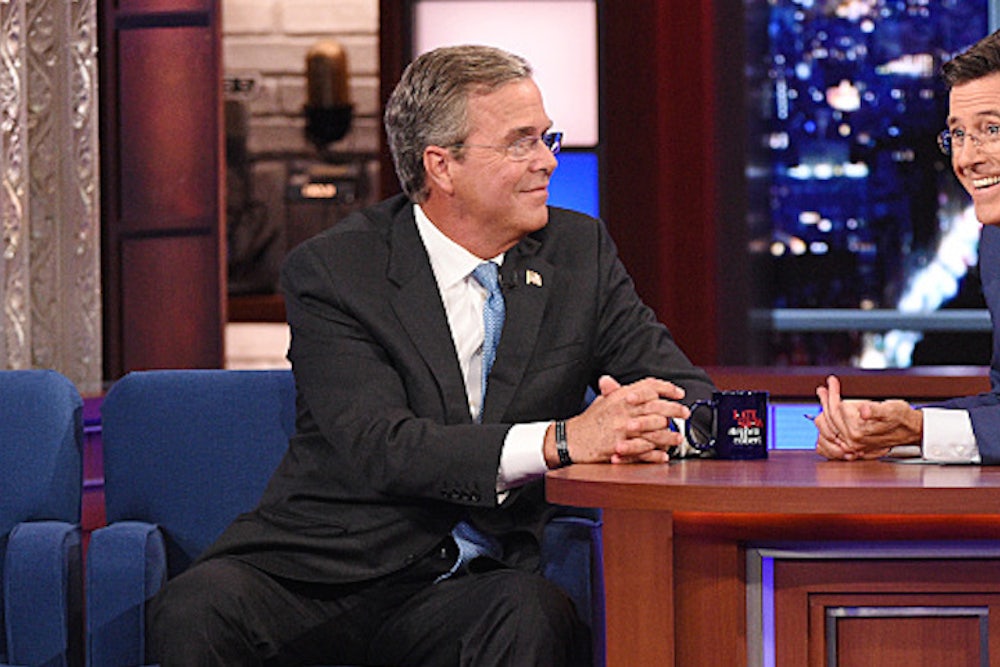In the months preceding The Late Show with Stephen Colbert's premiere Tuesday on CBS, the comedian was cagey about the format of his new show, refusing to even confirm that there would be an opening monologue. In the rigid world of network late-night, that would have been huge news; when Seth Meyers announced this summer that he would start delivering his monologue sitting down, at a desk, he went on a media tour to explain his radical choice.
But Colbert, it seems, was just teasing us: His first night as host was giddy and conventional, comfortably familiar to the audiences of Dave Letterman, whom he's replaced, and his now-retired show on Comedy Central, The Colbert Report. He had a monologue (standing up, naturally) and an interview, then another interview and a musical performance. He had a kicky new theme song, a sprawling set decorated with self-portraits and Americana, and a house band led by jazz musician Jon Batiste. With The Late Show, Colbert isn't re-inventing the late-night genre, just injecting it with his own dizzy sensibility.
The show may not revolutionize late-night TV, but Colbert did easily distinguish himself from his competitors—NBC's Jimmy Fallon, who made two cameos last night, and ABC's Jimmy Kimmel. His interview with George Clooney was confidently awkward ("We don't know each other," the two of them kept saying) and his sit-down with Jeb Bush, the second guest of the night, at least gestured toward political substance, as he pushed Bush to explain what policy issues he disagreed with his brother about. “I used to play a narcissistic conservative pundit," he told Bush. "Now I’m just a narcissist." Colbert, in a bright-blue suit and a wide smile, did seem freer inhabiting his real persona, able to embrace the sincerity and joy he had to sidestep while playing a conservative blowhard. He began the show dancing around like Ellen DeGeneres, sharing high-kicks with Batiste, and spinning around the stage.
Still, he made time for a few weird high-concept setpieces that would have been at home on The Colbert Report, including some shticky native advertising, featuring Colbert dejectedly plugging roasted red pepper hummus as part of a demonic deal to get the Late Show gig. Self-aware product-placement, which once seemed so fresh on 30 Rock, has long since become rote, a tiresome case of having your Nabisco Oreos and eating them too. But thanks to an ancient Hittite demon, Colbert's Sabra promotion skipped over cynical knowingness and was surprisingly non-grating.
Colbert's first night was a success, but it may not have answered the most pressing question, at least from CBS's perspective: Will moments from the show go viral the next morning? CBS president Les Moonves admitted, in a long interview in this week's issue of New York magazine, that online clips of late-night shows produce significant revenue. In his last gig, Colbert clips earned clicks for eviscerating, destroying, and crushing the GOP. That's unlikely to fly on CBS, however politically minded the show is.
His network competition, meanwhile, has mastered the viral game with goofy celebrity stunts. At this, Colbert stumbled. He wore a cotton-candy hairpiece to imitate Trump at the show's taping, in a moment that was cut for broadcast. A bit where he helped Bush give "Trumpier" responses was posted online as an extra; it couldn't overcome the blandness of Jeb's personality. While Colbert seems capable of merging the giddy enthusiasm of Fallon with the meta-irony of early Letterman, he may not be as skillful at creating the ready-for-YouTube, celebrity-studded stunts that are now late-night comedies' bread-and-butter.
